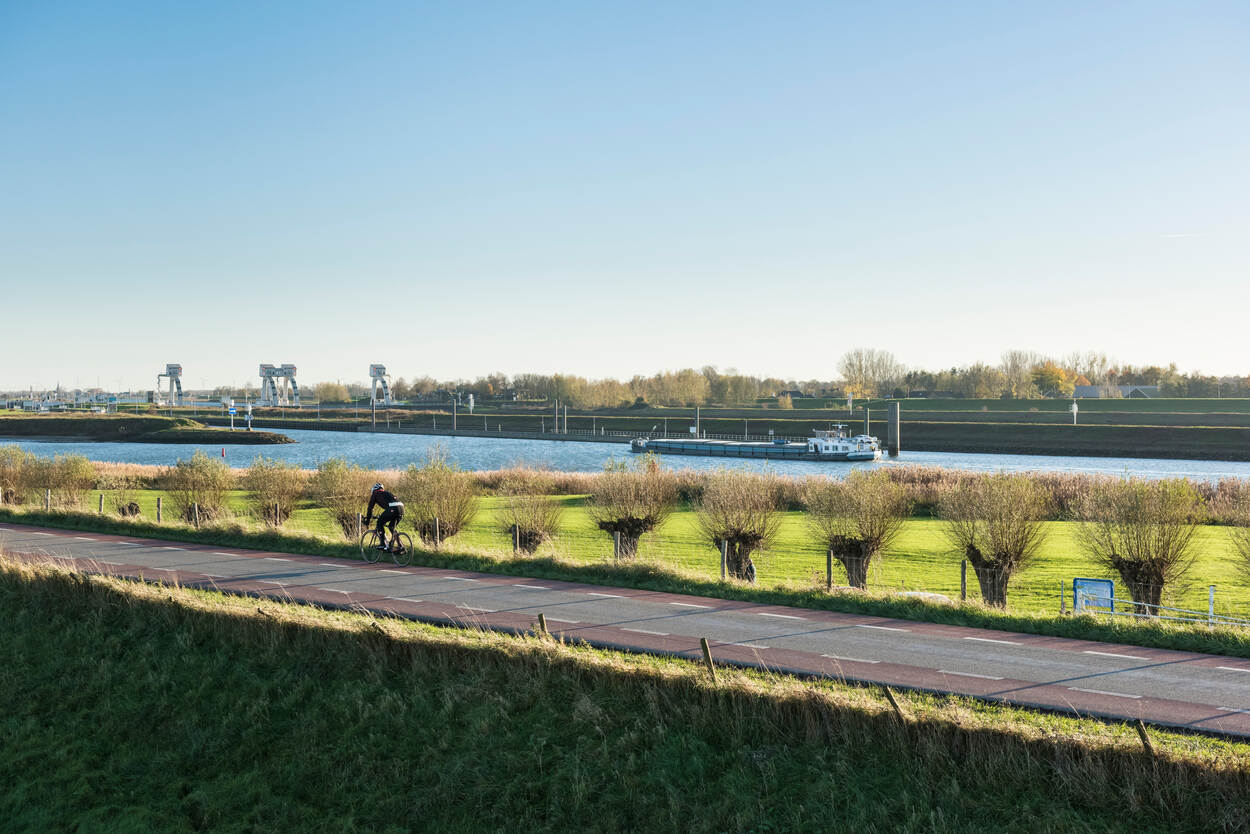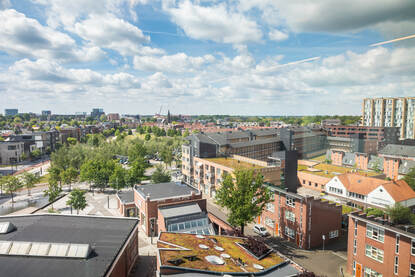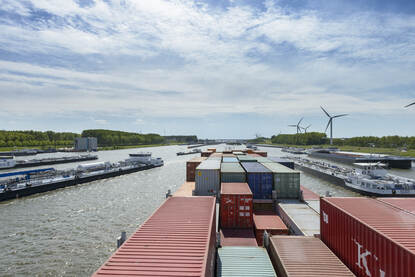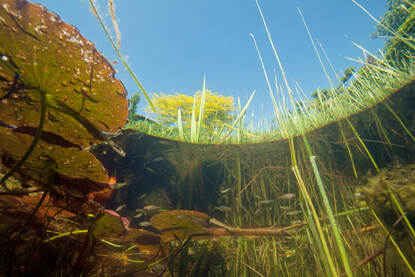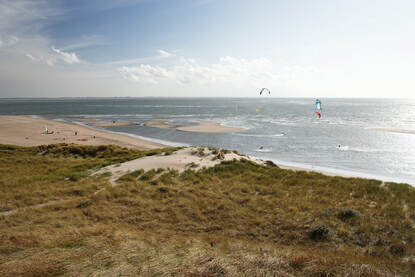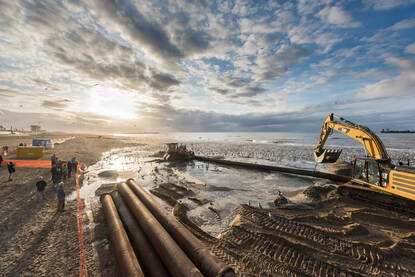Dutch people live in a country that is defined by water. The challenges relating to water are extensive and are bound to become more formidable in the future. To keep our country safe, attractive and viable for our future generations too, the National Water Programme 2022-2027 (NWP) was developed. The NWP entails the main points of water policy and the management of national waters and national waterways.
Water-related challenges
The major challenges that already present themselves in the water domain will only get bigger and more complex in the future. These include:
- Anticipating the consequences of climate change for the Netherlands by providing adequate protection against floods, water-robust spatial planning, and freshwater supplies that are also sufficient in the face of increasing drought.
- Preventing soil subsidence by directing sufficient water to the right areas.
- Continuing work on the quality and quantity of our groundwater and surface water, recovery of biodiversity and sustainable drinking water supplies.
- Guaranteeing a fast, safe, robust and sustainable water transport system.
- Balancing the many designated uses on the North Sea, such as wind energy, nature development, fisheries, shipping and sand extraction.
- The preservation and, where necessary, replacement or renovation of infrastructure, such as flood defence systems, bridges and weirs.
All these changes exacerbate the current challenges related to flood risk management, pluvial flooding, freshwater and drinking water supplies, water quality, nature, landscape, cultural heritage and shipping. The Netherlands must adapt to all this and this necessarily includes climate adaptation. The figure below presents an overview of the consequences of climate change for the physical living environment.
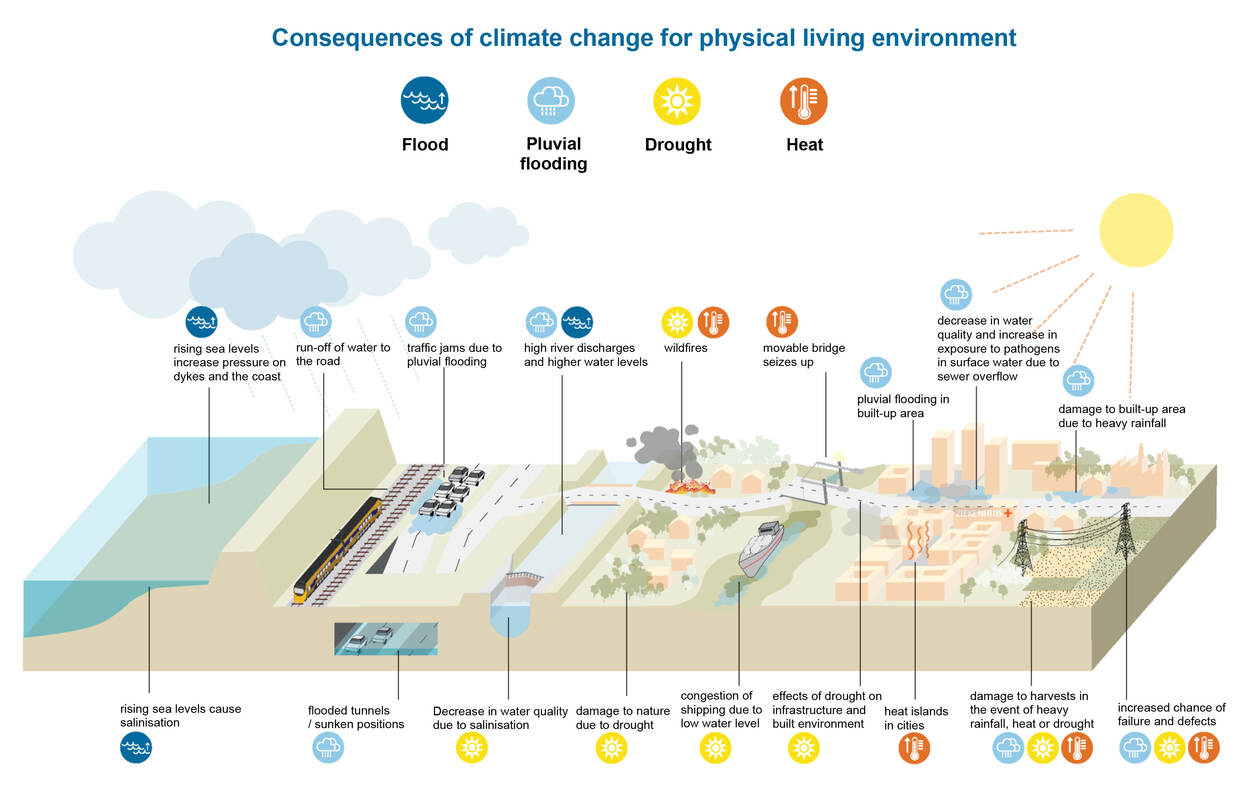
Integrated approach in the living environment
The different water-related challenges are not isolated issues. They are related to each other, but also to all other challenges in the living environment. Objectives for climate adaptation, for example, cannot be separated from urbanisation and housing, and objectives for water quality are closely linked to agricultural policy. An integrated approach with other challenges in the physical living environment, such as the energy transition, housing, nature recovery and the agricultural transition, is therefore essential. The National Strategy on Spatial Planning and the Environment (NOVI) presents an important first step towards this integrated approach, which is elaborated for the water domain in the National Water Programme.
“To keep our country safe and attractive for future generations and restore biodiversity, it is important to address challenges in an integrated manner together with natural solutions. Connecting water, soil and land use is essential for this.”
Jos de Bijl, physical geographer and board member of Bureau Stroming
Water and the living environment
Water plays a key role in the four priorities for the living environment as set by the national government in the NOVI. The priorities comprise related challenges in which water always plays an important role. This NWP elaborates NOVI policy on these four priorities.
- Space for climate adaptation and energy transition
Climate adaptation is largely about how we must deal with challenges related to water. The Netherlands will have to continue to work on protection against floods and their consequences. We must, however, also anticipate protracted periods of drought, with a view to our freshwater supplies and shipping. The energy transition will also largely take place on and around water. An enormous challenge presents itself in this respect, particularly on the North Sea.
- Sustainable economic growth potential
To safeguard a sustainable economy, the Netherlands depends on water to a large extent. This includes shipping, agriculture, drinking water, process water and recreation. In addition, sufficient and clean water is a key factor for companies and people to settle somewhere. - Strong and healthy cities and regions
We must future-proof cities so that they can stay strong and healthy. Many cities face the challenge of preventing pluvial flooding, heat stress, and the consequences of flooding and droughts.
- Future-proof development of rural areas
The future-proof development of our rural areas requires a better balance between the use of land and water (e.g. by agriculture) and the requirements of our human capital: healthy soil and water systems and the related nature.
“There are major challenges concerning climate change and climate adaptation. Water plays an essential role in this. Opportunities can be created by also linking the themes at a strategic level.”
Frances Heijman (EemsDollard2050)
Assessment principles
Many challenges for the living environment come together within a small area in the Netherlands. Not everything is possible and sometimes we have to make choices. To help make these choices, the National Strategy on Spatial Planning and the Environment (NOVI) includes assessment principles that the NWP elaborates for the water domain. These assessment principles are presented in the figure below.
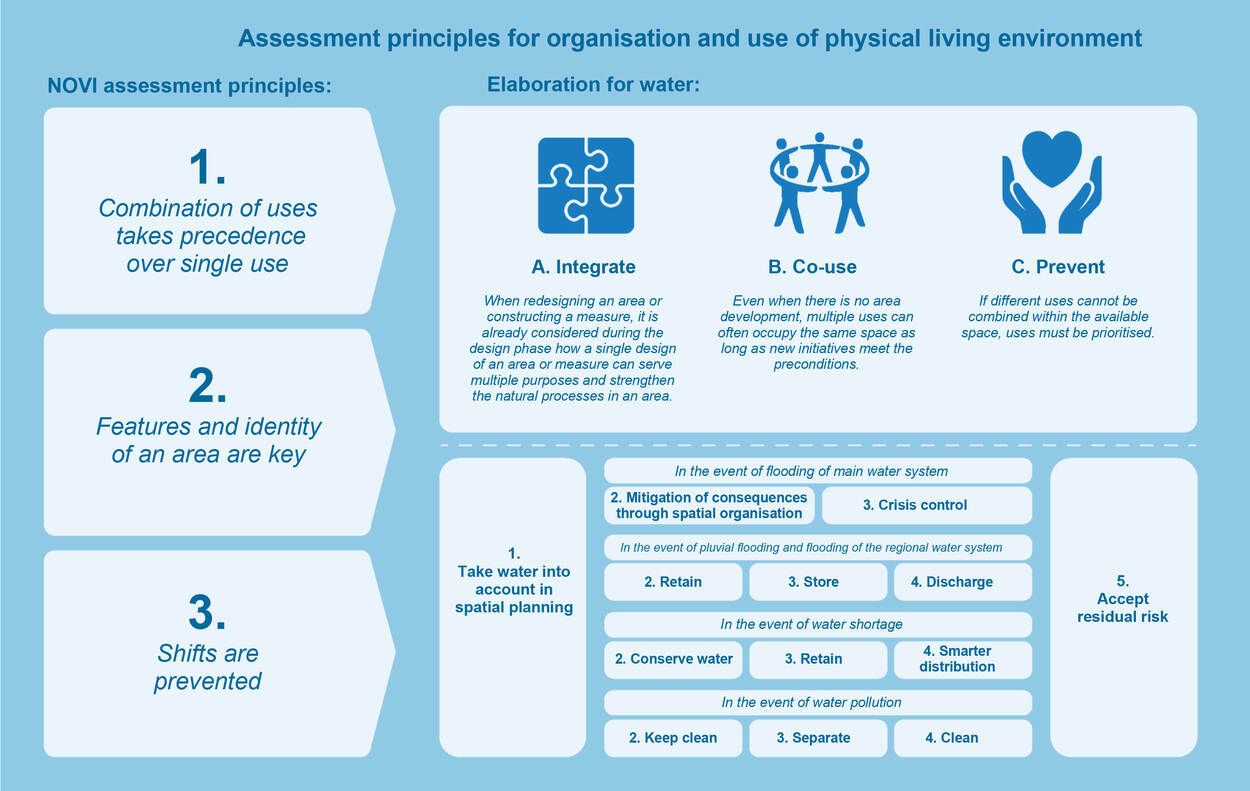
Water and soil as guiding principles
It is also about choices in terms of spatial organisation of the Netherlands, such as: where will we live or where will we recreate? In the Netherlands, as a country defined by water, we build upon the characteristics of the water system. For an integrated approach to the different challenges, the soil and water system is included as a guiding principle. In this way, we are focusing, even more than before, on spatial planning that factors in the natural properties of the soil and water system, as well as the possibilities and limitations this system entails.
“There are so many different regional programmes that touch on water and the living environment: housing, the energy transition, climate adaptation, circular agriculture, nitrogen reduction. Interconnectivity between these policy areas and the related money flows must be increased. The national government should take the lead in this.”
Co Verdaas (chair of the Rivierenland water authority board)
Main ambitions for the Netherlands as a country defined by water
The need for an integrated approach, together with the priorities from the NOVI and the challenges mentioned above, constitutes the basis for the 3 main ambitions of the National Water Programme 2022-2027:
• A safe and climate-proof delta (chapter 2)
• A competitive, sustainable and circular delta (chapter 3)
• A clean and healthy delta with high-quality nature (chapter 4)
This public version of the National Water Programme 2022-2027 summarises these ambitions. Each of them has its own chapter, explaining both the policy goals and the management tasks. The chapters also contain quotes from stakeholder stories, which can be read in their entirety by clicking through. Furthermore, chapter 5 centres on cooperation with water partners and other sectors. This cooperation is crucial for an effective approach. Chapter 6, finally, is about area-based elaborations for the different major water bodies in the Netherlands.
